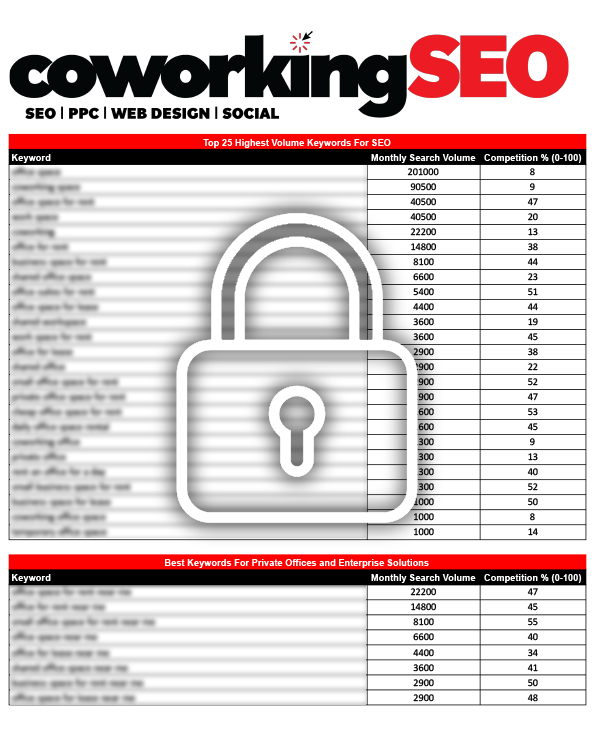Are you ready to take your commercial real estate business to the next level? Are you ready to learn how to market commercial real estate?
In today’s highly competitive market, it is important to have a marketing strategy that will help you stand out and attract the attention of tenants and investors who are more and more demanding speed and frictionless experiences while searching for new property and investment opportunities.
More than 80 buyers and tenants start their property search on the internet today. To effectively market your commercial real estate listings and stand out against the competition, you need to develop a marketing strategy that goes beyond flyers, brochures, and LoopNet listings.
Here are 20 key marketing strategies to help you grow your commercial real estate business and expand your digital footprint.

1. Establish Your Goals and Determine Your Ideal Audience
To understand how to market commercial real estate, you must first understand your audience and objectives. It’s hard to develop a marketing strategy that will resonate with clients and drive business growth without these two factors. Establishing your goals is crucial. Do you want to increase your sales? Do you want to attract a specific type of buyer or renter? Knowing what you want to achieve will help you tailor your marketing efforts accordingly. It could be as simple as selling more properties or as complex as building a loyal client base.
Once you have clarity on your goals, the next step is to determine your ideal audience. Who are the potential buyers or renters that you want to target? Consider demographics such as age, income, and location. Are you aiming to appeal to first-time homebuyers, retirees, or renters in a particular neighborhood? Understanding your target audience will allow you to customize your marketing messaging and channels to reach them effectively.
In today’s digital age, there are numerous tools and platforms available to help you identify and reach your ideal audience. Social media platforms like Facebook and Instagram offer targeted advertising options, allowing you to reach specific demographics in your desired location. Real estate websites and online forums can also provide insights into the preferences and needs of potential buyers or renters.
Establishing your goals and determining your ideal audience are pivotal first steps in any real estate marketing strategy. By understanding who your target audience is and what you want to achieve, you can develop a tailored approach that resonates with potential clients and maximizes your chances of success.
Answer the Following Questions Before Moving on to the Next Step:
-
- What are your clients’ key criteria for making decisions?
-
- What sites do your customers visit?
-
- How will you reach out to them?
-
- What are the creative assets you will need to create?
-
- What are the tools and resources you will need?
-
- What is your budget for the year?
-
- How will you define success?
Do a quick study of how your competitors are marketing themselves and their properties. Then, think about ways you can stand out and differentiate yourself.
By taking the time to define your unique differentiations, you will be able to create a solid foundation for future marketing materials and communications.
2. Develop a Commercial Real Estate Marketing Plan
What is an estate marketing plan? How do you create one?
A marketing plan gives you a complete overview of your mission, unique selling proposition, target audience, strategies, and metrics that will be used to measure success.
Include your:
-
- Business Summary
-
- Target market and audience
-
- Budgets are available for all budgets.
-
- Marketing channels
-
- Marketing material
The Following Are the Metrics That You Can Use to Measure Your Effectiveness:

A good commercial real estate marketing plan should include a balanced marketing mix that leverages Earned Media, Paid Media, and Owned Media. Earned Media refers to the publicity and exposure your brand receives through word-of-mouth, press coverage, shares on social media, and other forms of organic marketing. This metric can be measured by tracking your brand mentions, social media shares, and the reach of your content.
Paid Media involves the use of paid advertising channels such as online ads, sponsorships, and influencer collaborations. To measure the effectiveness of your paid media efforts, you can track metrics such as click-through rates, conversion rates, and return on investment.
Owned Media refers to the content and channels that you own and control, such as your website, blog, social media accounts, and email list. To measure the effectiveness of your owned media, you can monitor metrics such as website traffic, engagement rates, email open rates, and subscriber growth.
It is important to also consider your specific marketing goals and key performance indicators (KPIs) when evaluating the effectiveness of your marketing efforts.
By Regularly Tracking and Analyzing These Metrics:
You can gain insights into what’s working and what needs improvement, allowing you to refine your marketing strategy for better results.
-
- Earned Media- Includes marketing activities you “earn” from advocates of your brand, and includes free channels like SEO, Social Media.
-
- Paid Media- Any performance-based channel or paid advertising such as banners, cost-per-click, remarketing, and paid advertising.
-
- Owned media- This includes media assets that you own, such as websites, blogs, and social media profiles.
-
- The marketing mix should be spread across multiple channels to reduce the risk of failure in one marketing area.
-
- Start mapping the elements you will need to implement your strategy.
Plan what content you will need to market your property based on the type of asset and the audience. The budgets for producing content to present a multifamily home could be different than those of marketing industrial property.
3. What Tools and Software Do You Need?
You need the right tools to execute a successful marketing strategy for commercial real estate. Your “marketing stack” is a collection of tools that cover a wide range of uses and requirements. From contact management to email marketing to listing presentations and more.
You should give your technology selection the attention it needs so that you won’t need to change platforms. Switching from one real estate marketing software platform to another is expensive and can reduce productivity.
Businesses that optimize and streamline their marketing processes are more likely to achieve sustained growth.
4. Upgrade Your Website
It is important to remember that your company’s website will often be the first impression a prospective client gets. This can help to build trust and confidence in them. Therefore, it is essential to regularly update and upgrade your website to ensure it reflects the latest trends and technologies. Upgrading your website can involve various elements, such as improving its design, enhancing usability, optimizing for mobile devices, and implementing the latest security measures.
Firstly, a visually appealing design is crucial to attract and engage visitors. An outdated or cluttered design can drive potential customers away. By upgrading your website’s design, you can create a modern and professional look that aligns with your brand identity, making it more appealing and memorable.
Secondly, optimizing your website for mobile devices is vital in today’s mobile-centric world. With more and more people accessing the internet through smartphones and tablets, having a responsive design that ensures your website looks and functions well across all devices is essential. This will not only improve user experience but also boost your search engine rankings.
Lastly, upgrading your website’s security is of utmost importance. With cyber threats on the rise, ensuring your website is secure is crucial to protect your company’s and clients’ sensitive information. Upgrading to the latest security measures, such as SSL certificates and regular backups, can safeguard your website from potential attacks and instill confidence in your visitors.
You can use it as a marketing tool to showcase company news, show thought leadership with blog posts and research, and market your properties using a search engine for commercial properties.
Before you begin a relationship, you should ask questions to gauge the agency’s level of experience and professionalism.
5. Create feature-rich property websites
If you don’t create a strong digital presence for your property, your competitors will eat your lunch in 2024.
Interactive property websites can be great for showing off your commercial properties. They can be used as a hub for all your commercial property marketing, but they also can add a “wow” element that will help you engage and convert more visitors.
Content-rich sites are a key component of high-performance property websites:
-
- Professional Photography
-
- Video Footage
-
- Virtual tours in 3D
-
- Information on availability
-
- Floor plan PDFs
-
- Interactive Maps
6. Segment and Build Targeted Email Campaigns
A cost-effective email marketing strategy for commercial real estate can be used to engage prospects in conversation and close deals.
One of the most important marketing strategies you can use to fuel your leasing or sales efforts is building and segmenting a list of prospects.
You can start by building it through your website, blog, and lead capture pages. You can use email marketing software, or a real estate commercial CRM to store your contacts. Segmenting your email campaigns allows you to customize your messaging for specific groups of prospects. By categorizing your contacts based on criteria such as location, buying stage, or interests, you can create targeted campaigns that resonate with each segment.
Targeted email campaigns increase the chances of engagement and conversions. When you send personalized content to genuinely interested people, they are more likely to open, read, and take action. This ultimately boosts your email marketing ROI.
To segment your list effectively, use a combination of demographic data and behavioral insights. For example, if you’re a real estate agent, you might create segments for first-time homebuyers, sellers looking to downsize, or investors. This way, you can send each group relevant information, offers, and resources tailored to their specific needs.
Remember to regularly update and refine your segments as your prospect list evolves. Keep an eye on analytics to track the success and optimize your targeted email campaigns. Continuously testing different strategies and messaging will help you refine your approach and achieve better results over time.

7. Add your Listings on Commercial Real Estate Portals
Listing services and portals for commercial real estate are a great way to market your property, whether it is for sale or lease. They allow you to target a highly relevant audience and generate exposure. These platforms are specifically designed to connect property owners, brokers, and potential tenants or buyers. By adding your listings to these portals, you can reach a highly targeted audience that is actively searching for commercial real estate opportunities.
Commercial real estate portals offer a range of services and tools to enhance the visibility and appeal of your listing. You can include detailed property descriptions, high-quality photos, and even virtual tours to showcase the unique features and amenities of your property. This helps to attract the attention of interested parties and increases the chances of a successful transaction.
Moreover, listing your property on commercial real estate portals provides you with widespread exposure. These platforms are visited by thousands of investors, brokers, and businesses looking for commercial properties. This exposure significantly expands your reach and ensures that your listing reaches a large pool of potential buyers or tenants.
In conclusion, if you want to effectively market your commercial property, be sure to add your listings on commercial real estate portals. These portals provide valuable services and tools to enhance the visibility of your property and connect you with a targeted audience. By leveraging the power of these platforms, you can increase your chances of finding the right buyer or tenant promptly.
8. Create a Google My Business Page
Google My Business helps local businesses to promote themselves online. It is free. The searcher can find relevant results based on their location. By creating a Google My Business page, local businesses can make their presence known to potential customers in their area. This easy-to-use platform allows businesses to provide their address, phone number, business hours, and even their website. It also enables customers to leave reviews, which can greatly impact a business’s reputation.
Having a Google My Business page means that your business will appear in Google search results as well as on Google Maps. This can greatly increase your visibility and attract more customers in your local area. Additionally, Google My Business provides valuable insights and analytics, allowing businesses to track how their page is performing and make necessary adjustments to their marketing strategy.
Create a Google My Business listing for your business to give it more visibility. This will ensure that your property is listed on Google Maps and the first half of Google search. The searchers can see your property and the surrounding area before they visit you to get more information.
You can also use your business profile to upload photos, to promote new products, or to respond to customer reviews. Use it to update your business information so that people searching for you always know how you can be contacted.
9. SEO Optimize Your Website
As early as you can, create a real estate search engine optimization plan. Search engine visibility can be a powerful tool for your business, driving tenants, brokers, and investors to visit your website. To optimize your website for search engines, start by conducting keyword research. Identify the terms and phrases that potential clients may use when searching for real estate services in your area. Integrate these keywords strategically into your website’s content, including page titles, headings, and meta descriptions.
Next, focus on improving the overall user experience of your website. Ensure that your site is mobile-friendly, as Google prioritizes mobile-responsive sites. Make sure your website loads quickly and is easy to navigate. Create valuable and informative content, such as blog posts or articles, that address common questions and concerns in the real estate industry.
In addition to on-page optimizations, it’s essential to build a network of high-quality backlinks to your website. Reach out to reputable websites, such as local directories or industry blogs, and request to have your website featured. These backlinks not only drive referral traffic but also enhance your website’s authority in the eyes of search engines.
Regularly monitor and analyze your website’s performance using tools like Google Analytics. Pay attention to metrics like organic traffic, bounce rate, and conversion rates. By regularly evaluating your SEO efforts, you can make necessary adjustments to further improve your website’s visibility and attract more potential clients to your real estate business.
10. Nurture Your Contacts With Useful Content
Nurturing contacts with content can help you stay in their minds and encourage them to engage with your company. When it comes to building strong relationships with your contacts, providing them with useful content is key. By consistently offering valuable information, tips, and insights, you can demonstrate your expertise and position yourself as a trusted resource. Whether it’s through blog posts, emails, social media updates, or webinars, nurturing your contacts with relevant content keeps them engaged and interested in what you have to offer.
One of the main advantages of nurturing your contacts with content is that it allows you to stay in their minds. By consistently providing them with valuable information, you remain relevant and top-of-mind when they need products or services in your industry. Additionally, sharing content that meets their needs or solves their pain points helps establish your credibility and expertise, making you the go-to source for information and solutions.
Furthermore, nurturing your contacts with useful content is an effective way to encourage engagement. By offering educational and entertaining material, you create opportunities for your contacts to interact with your company. This can include reading and sharing your blog posts, commenting on your social media updates, participating in webinars or online events, or subscribing to your email newsletter. Engaging with your content can lead to increased brand loyalty, word-of-mouth recommendations, and even potential sales opportunities.
By consistently nurturing your contacts with valuable content, you can create stronger relationships and generate interest in your company. Providing useful information allows you to stay in their minds, positioning yourself as a trusted resource. Moreover, it encourages engagement and further interactions, ultimately leading to increased brand loyalty and potential sales. So, focus on delivering quality content that effectively meets the needs of your contacts, and watch your relationships flourish.

11. Share Your Content on Social Media
social marketing for commercial real estate can be a free way to increase brand awareness and bring more traffic to your site. Social media is also used by savvy commercial real estate professionals to facilitate connections and spark conversations with potential clients and partners. One of the key aspects of using social media for business purposes is the ability to share content.
When you share your content on social media platforms like Facebook, Twitter, and LinkedIn, you open up a whole new avenue for attracting traffic to your website. This increased visibility can lead to more clicks, shares, and engagement, ultimately driving more traffic back to your site.
Additionally, social media provides an excellent opportunity for commercial real estate professionals to connect with potential clients and partners. By sharing informative and relevant content related to the industry, you can position yourself as an expert in your field and spark conversations with those interested in your services.
Sharing your content on social media is a powerful strategy that can help you attract more traffic to your site and foster meaningful connections with potential clients and partners. It allows you to tap into a vast audience and engage with them on a personal level. So, if you haven’t already, start incorporating social media into your content-sharing strategy and watch your online presence soar.
12. Create a Paid Social Media Advertising Strategy
You can also increase awareness of commercial real estate by using advertising campaigns on Twitter, Facebook, and LinkedIn that are based on performance.
These platforms allow you to create very targeted campaigns. You can choose who, where, and when your ads are shown.
If you’re leasing a property in the life sciences industry, you might launch a marketing campaign that targets C-level executives from the biosciences in a certain geography.
13. Publication of Press Releases Is a Regular Practice
Press releases are a great way to reach out to people who may be able to add your company’s information to a magazine. Publishing press releases has become a regular practice for businesses across various industries. By crafting well-written press releases, businesses can grab the attention of journalists and reporters who are always on the lookout for newsworthy content. This not only increases the chances of getting media coverage but also enhances brand visibility and credibility.
The publication of press releases is an effective method for companies to share exciting news, such as product launches, corporate announcements, or event updates. By providing concise and relevant information, businesses can generate curiosity and interest among readers, urging them to take action or seek further details.
Additionally, regular publication of press releases helps businesses maintain an active and engaging online presence. By consistently sharing newsworthy updates, companies can stay connected with their audience and keep them informed about recent developments. This not only helps in building and nurturing relationships but also positions the business as an industry leader. Moreover, press releases can also contribute significantly to search engine optimization (SEO) efforts. When properly optimized with relevant keywords and links, press releases can improve a company’s online visibility and drive organic traffic to its website.
Do some research before sending out a release to determine who is responsible for the section on commercial real estate in the publications that you are targeting.
It is important to send the information you need to the right people to get the response that you desire.
You’ll find their email addresses on their bios or under other articles about commercial real estate.
You’ll eventually be able to create your “black book” with influencers. This is a valuable asset that can save you thousands in PR agency fees. They often spend the majority of their time on outreach.
You may not receive much response to your first press release, but you should keep sending them. You never know when one of them will be picked up.
Relationships with journalists, bloggers, and influencers can be enriching. Press mentions are a powerful way to boost your brand’s awareness.
A “black book” is an invaluable asset that will save you thousands in PR agency costs. These agencies spend the majority of their time on outreach.
14. Create a Google Keyword Campaign
Google receives 500 million searches per day, and your clients will likely be searching for keywords related to your business or commercial property right now. Google Adwords can be a powerful channel for acquiring commercial real estate advertising, but keywords in real estate can be expensive depending upon your target market. Adwords allows you to set your budget at whatever level you are comfortable with.
You can also stop the campaign at any time. One effective way to increase traffic to your website and attract potential customers is through a Google Keyword Campaign. This advertising tool, known as Adwords, allows you to create ads and choose specific keywords that are relevant to your business or niche. By bidding on these keywords, your ad will be displayed to users who are searching for those specific terms on Google.
Creating a Google Keyword Campaign is relatively simple. First, you need to research and identify keywords that are commonly used by your target audience. This step is crucial as it ensures that your ad is shown to the right people. Once you have a list of keywords, you can start bidding on them by setting a maximum bid amount that you are willing to spend per click.
One of the greatest advantages of utilizing Adwords is the flexibility it offers in terms of budget control. It allows you to set a daily budget that suits your financial circumstances. This means that you can tailor your ad spend based on your preferred level of investment. Adwords also grants you the ability to pause or stop your campaign whenever you wish, providing you with a level of control over your expenditure.
15. Create Paid Commercial Real Estate Ads Through Display Campaigns
Display advertising is available in many formats. It can raise brand awareness, and reach thousands (or even millions) of people quickly. One effective way to utilize display advertising is by creating paid commercial real estate ads. This allows real estate companies to showcase their available properties to a targeted audience. By utilizing display campaigns, companies can reach potential investors, businesses, and individuals who are actively searching for commercial real estate opportunities.
Paid commercial real estate ads through display campaigns offer several advantages. First, they provide a visually appealing way to capture the attention of potential buyers or tenants. These ads can include high-quality images, videos, and detailed information about the property’s location, size, amenities, and pricing.
Second, display campaigns allow companies to target specific demographics and interests. This ensures that the ads are shown to individuals who are actively looking for commercial real estate and have the potential to become future clients. By utilizing targeting options such as location, industry, and job titles, companies can maximize the efficiency of their advertising efforts.
Display campaigns provide valuable analytics and insights. Real estate companies can track the performance of their ads, including the number of views, clicks, and conversions. This data allows them to refine their targeting and ad creatives for better results.
Adwords, for example, can be used to advertise commercial real estate. It allows you to target your ads very precisely and you decide which websites your Ads will appear on.
16. Remarketing Is a Great Way to Target Your Visitors.
Remarketing is more than just display advertising. A cookie is placed on the computer of a visitor to your site so that you can show them relevant Ads on other websites. This type of targeted advertising is highly effective because it allows you to reach out to potential customers who have already shown an interest in your products or services. By reminding them of what they were looking at on your site, you increase the chances of converting them into actual buyers.
One of the main advantages of remarketing is that it allows you to stay top-of-mind with your audience. Even if they didn’t purchase their initial visit, seeing your Ads across different websites keeps your brand in their thoughts and increases the likelihood of them returning to your site.
Remarketing also provides the opportunity to personalize your Ads based on the specific products or pages viewed by the visitor. By tailoring your messaging to their interests, you can deliver a more targeted and compelling message, which ultimately leads to higher conversion rates.
In conclusion, remarketing is an incredibly powerful tool for any online business. By targeting your visitors and showing them relevant Ads, you not only stay top-of-mind with your audience but also increase the chances of turning them into valuable customers. Take advantage of this effective strategy to boost your online marketing efforts and see the positive impact it can have on your business.
It is a great way to keep your website or property listings “top-of-mind” and to drive previous visitors back to the site.
17. Attend Industry Events and Conferences
Commercial Real Estate Events offer a fantastic opportunity to build relationships, create leads, and gain knowledge about industry trends and the market. Attending industry events and conferences is a must for anyone looking to excel in their field. These events bring together professionals from various companies and sectors, creating the perfect environment for networking and forging valuable connections. In the commercial real estate industry, where relationships are key, attending these events can significantly enhance your career prospects.
One of the main benefits of attending industry events is the opportunity to create leads. By interacting with fellow professionals, you have the chance to showcase your expertise and services, leading to potential collaborations or referrals. In a competitive market, these leads can make a substantial difference in securing new clients and expanding your business.
Furthermore, industry events provide an avenue for gaining knowledge about the latest trends and developments. Oftentimes, these events feature expert speakers who share their insights and experiences, allowing attendees to stay up-to-date with the rapidly evolving commercial real estate landscape. Keeping abreast of industry trends not only helps you adapt to changes but also positions you as a knowledgeable and reliable professional in the market.
Other marketing channels make it difficult to establish many relationships or have in-person interactions in a short time. It’s important to have an event marketing strategy that is well-defined because participation and attendance can be expensive.
18. Advertise in Trade Journals
Trade journals in commercial real estate are read by thousands of brokers, potential investors, and industry peers every day. Advertising in trade journals can be a strategic move for businesses in the real estate industry. These publications offer a targeted audience that is specifically interested in the latest trends, news, and developments within the sector. By placing an advertisement in these journals, companies can reach potential clients and establish their brand as a prominent player in the market.
Trade journals have a loyal readership, and their content focuses on the specific needs and interests of professionals in the real estate industry. This means that advertising in these publications allows businesses to connect with a highly engaged and relevant audience. Whether it is a brokerage firm looking to attract new clients or a development company seeking investors, trade journals provide a platform to showcase products, services, and success stories to an interested and knowledgeable audience.
Furthermore, trade journals often offer different advertising options, allowing businesses to tailor their approach to their specific marketing goals. From full-page advertisements to sponsored content and advertorials, companies can choose the format that best suits their needs and budget. This flexibility ensures that businesses can maximize their exposure and make the most of their advertising investment.
Most industry magazines offer advertising options to advertise commercial real estate before a national audience, or a regional one.
Advertising in trade journals for commercial real estate can be a great way to increase your firm’s visibility, and credibility and generate leads.
19. Leverage Video for Your Properties
Video can be a powerful tool for marketing commercial real estate, as it allows buyers and tenants to see the property in action before they visit it. By leveraging video, you can create engaging virtual tours that showcase the key features and unique selling points of your properties. This not only saves time for both parties involved, but it also increases the likelihood of attracting serious and interested buyers.
Additionally, using video allows you to tell a story about the property, giving potential clients a more immersive experience. You can highlight the interior design, layout, and functionality of the space, allowing viewers to envision themselves in the property. Furthermore, video can incorporate aerial footage to provide a comprehensive view of the property’s location and surrounding amenities.
In today’s digital age, video has become a preferred medium for many individuals when researching and making purchasing decisions. By offering video tours of your properties, you are catering to the preferences of your target audience and gaining a competitive edge in the market.
Video tours are a great way to showcase the unique features of the property and give a feel for its size and layout. This can help generate interest and speed up decision-making. Videos and 3D virtual tours can also be shared easily on social media platforms and other online platforms to increase the visibility of the property.
20. Measure Your Success
Never forget this simple adage.
If you can’t quantify it, don’t mess it up.
Measuring the success of commercial real estate marketing activities is critical to a successful strategy. Define key metrics to measure the success of each marketing channel, create a report on real estate marketing, and use data-driven decision-making to improve your efforts.
Don’t let your strategy get stale. Test ideas and tactics constantly to determine what works, and what does not.
Don’t forget to consider how your marketing strategy impacts your business goals. You need to return to the drawing board if you cannot quantify the direct and indirect impact of your leasing-up, tenant retention, or sales efforts.
Marketing Strategy (Bonus)
You need to use a system and templates for commercial real estate. These will help you define your objectives, and key metrics, and then implement the campaign. By leveraging a well-defined marketing strategy, businesses can effectively reach their target audience and drive sales. One bonus approach to consider is utilizing a system and templates specifically tailored for commercial real estate. These tools play a crucial role in ensuring a successful campaign from start to finish.
First and foremost, having a system in place allows you to clearly define your marketing objectives. Whether it’s increasing brand awareness, generating leads, or driving conversions, having a set goal helps guide your efforts and measure success. With a system, you can also establish key metrics that align with your objectives, making it easier to track progress and identify areas for improvement.
Furthermore, utilizing templates can significantly streamline your marketing efforts. From creating engaging content to designing eye-catching visuals, templates provide a foundation that professionals can customize to fit their brand. By using pre-designed layouts and structures, you save valuable time and ensure consistency across different marketing channels.
Implementing a marketing campaign without a clear strategy and structure is like sailing without a compass. By embracing a system and templates tailored for commercial real estate, businesses can boost their chances of reaching their desired outcomes and ultimately achieve success in the competitive market.






